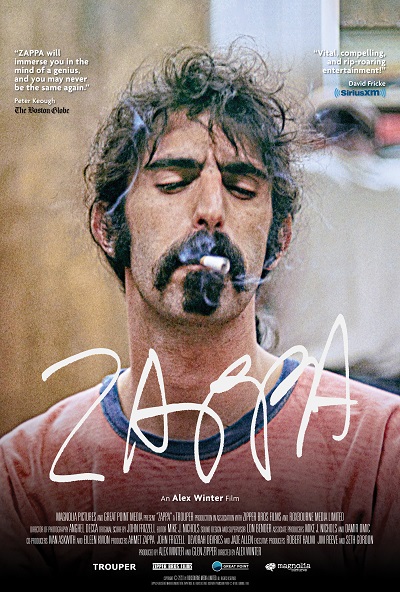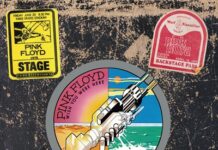Zappa, directed by Alex Winter of Bill & Ted’s Excellent Adventure (he’s Bill) fame, offers a deep dive into the American musical icon Frank Zappa’s life and work. Unearthing previously unseen footage — ranging from clips of Zappa’s early creative endeavors as a drummer, film maker and composer to the final time he appeared on stage — tons of interviews, concert performances, abstract bits and pieces, Zappa is a loving tribute that doesn’t skimp on the details.
We learn about the man’s formative years, growing up in the 1950s in Lancaster, a desert town in California. Not the best place for a budding iconoclast, Zappa made the best of it and befriended Don Van Vliet (aka Captain Beefheart) and listened to Clarence “Gatemouth” Brown, Elmore James, and other notable blues players. After discovering the music of Edgard Varèse, Zappa knew his ideas and creative urges were wildly divergent from those around him. He pushed through to learn guitar, create bands, and get out of Lancaster.
Winter marks Frank Zappa’s professional career step by step, interspersing the man’s witticisms as well as the thoughts of various participants Zappa enlisted along the way. Percussionist and marimba player Ruth Underwood offers up several poignant moments and even manages to play a Zappa composition on piano for this film.
For how well respected Zappa was by his zany following, what’s even more fascinating is how sought-out he was by others. At one point, the film points out that when Eric Clapton and Mick Jagger came to Los Angeles, they wanted to meet Frank Zappa. John Lennon and Yoko Ono crashed a Zappa and Mothers show in New York. Ringo Starr played Zappa in a movie. Even Saturday Night Live had him on, though in a voice-over, he complains about the experience.
Through the various ups and downs that plagued Frank Zappa’s career, Zappa ultimately offers a full blush portrait of an uncompromising artist; a band leader who didn’t make it easy for the musicians who played in his various bands; a man of principle who wasn’t afraid to speak his mind and take on the Washington D.C. political establishment; a cultural ambassador to Czechoslovakia nominated by the country’s president, Václav Havel; a family man content to be at home with his wife Gail and their four kids; a cigarette smoker, coffee drinker, and atheist who didn’t drink alcohol and take drugs — the list could go on and on.
It’s heartbreaking to watch the film as Zappa spends the last few months of his life composing music and struggling through prostate cancer that eventually killed him on December 4, 1993. As with everything he did, Zappa is characteristically calm and matter-of-fact about his impending demise, which makes it even more difficult to take in. As with most any artist who dies relatively young — Zappa was 52 — one can’t help but think about what more he could have done. Considering that he released over 60 albums during his lifetime, with almost as many coming out posthumously, it’s staggering to think how much music and chaos Frank Zappa would have created if he’d live a little longer. If nothing else, Zappa makes you appreciate the short time Frank Zappa was here. What’s more, it makes you realize he didn’t waste a minute of his time on anything that didn’t expand on his already impressive array of talents. Talk about inspiration.
~ Ralph Greco, Jr.




















